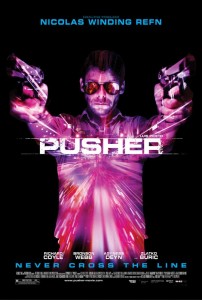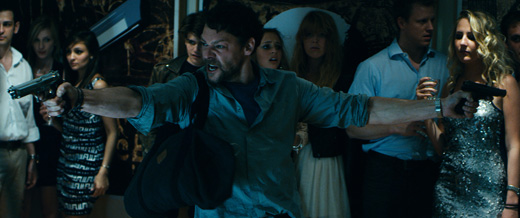 Pusher
Pusher
Written by Matthew Read
Directed by Luis Prieto
UK, 2012
1996’s Pusher launched the career of director Nicolas Winding Refn, and was followed by two sequels in the early 2000s. With some recurring characters but differing leads in each of the trilogy’s films, the first in the series concerned a man growing increasingly desperate, over the course of one week, after a botched exchange leaves him in massive debt to a ruthless drug lord. Refn is credited as an executive producer for Luis Prieto’s UK remake, which relocates the action from Copenhagen to East London. The location is all too familiar for British crime dramas, and the feeling of familiarity is additionally strong with Pusher 2012’s almost carbon copy recreation of the original’s own cliché narrative, which was never that film’s strongest asset.
Where Refn’s solid original tended to thrive was in its grimy style, which was littered with a type of handheld cinematography and grim colours that lent a disorienting edge to the downfall. Prieto’s film trades that aesthetic for a consistently sleek, bright look, and relies on the now irritatingly generic shaky-cam and sped up shots used to depict drug-enhanced stress in mainstream cinema; there’s even brief shots that directly ape the yellow haze look of Tony Scott’s Domino when things get really bad in the third act. In recalling every other drug crime film in appearance, the lead’s downfall in Preto’s film is limp and impotent, rather than the Franz Kafka-like, grim nightmare of Refn’s effort.
It may seem unfair to constantly bring the original film into comparison, but with little change to the concept sixteen years later, and even having Pusher trilogy star Zlatko Buric return in the drug lord role, association between the two films is inescapable. Even taken on its own terms, 2012’s Pusher is all too reminiscent of the most tiresome Cockney crime efforts, and burdened with that lifeless sleek style, a collection of not especially engaging performances in both major and supporting roles, and painful attempts at comedy; see Bronson Webb and Paul Kaye’s irksome turns for examples of the latter. The only real positive the film offers is an enjoyable enough soundtrack from electronic act Orbital, the lone highlight in a hollow, tedious thriller that is a slog even at 86 minutes.
Josh Slater-Williams





